Introduction
Artificial Intelligence (AI) is rapidly transforming the landscape of software development, making it more efficient and productive. By automating repetitive tasks, offering intelligent code suggestions, and speeding up debugging processes, AI tools like natural language code generation and automated testing are revolutionizing the coding environment. Notably, a randomized controlled trial involving hundreds of software development teams revealed that those using AI-powered tools completed tasks approximately 30% faster than their peers relying on traditional methods.
This significant productivity boost underscores the transformative potential of AI in software engineering.
The integration of AI into coding workflows not only accelerates development but also enhances collaboration, reduces bottlenecks, and fosters better teamwork. As AI continues to evolve, its capabilities are reshaping the roles and responsibilities of developers, driving the need for new skills and training. This article delves into the multifaceted benefits of AI in coding productivity, supported by research findings, case studies, and comparative analyses, to illustrate how AI is poised to become an indispensable part of the modern developer's toolkit.
Benefits of AI in Coding Productivity
AI resources are transforming coding efficiency by automating repetitive tasks, providing intelligent code recommendations, and accelerating debugging processes. In a randomized controlled trial involving hundreds of programming groups from a large multinational corporation, those utilizing AI-powered resources finished their tasks approximately 30% quicker on average than groups employing conventional resources. 'These AI tools, which include features like natural language code generation, automated testing, and intelligent code completion, enable developers to tackle more complex problems, thereby speeding up the application creation process.'.
The study's findings, backed by comprehensive telemetry data, highlight the significant beneficial effect of AI on development speed and efficiency in real-world enterprise settings. By streamlining workflows, AI leads to significant efficiency gains and cost savings, allowing teams to deliver high-quality projects on time. As AI continues to advance, its integration into engineering workflows is reshaping the responsibilities of engineers and driving the need for new skills and training. The transformative potential of AI in software engineering is undeniable, offering notable improvements in productivity and efficiency.
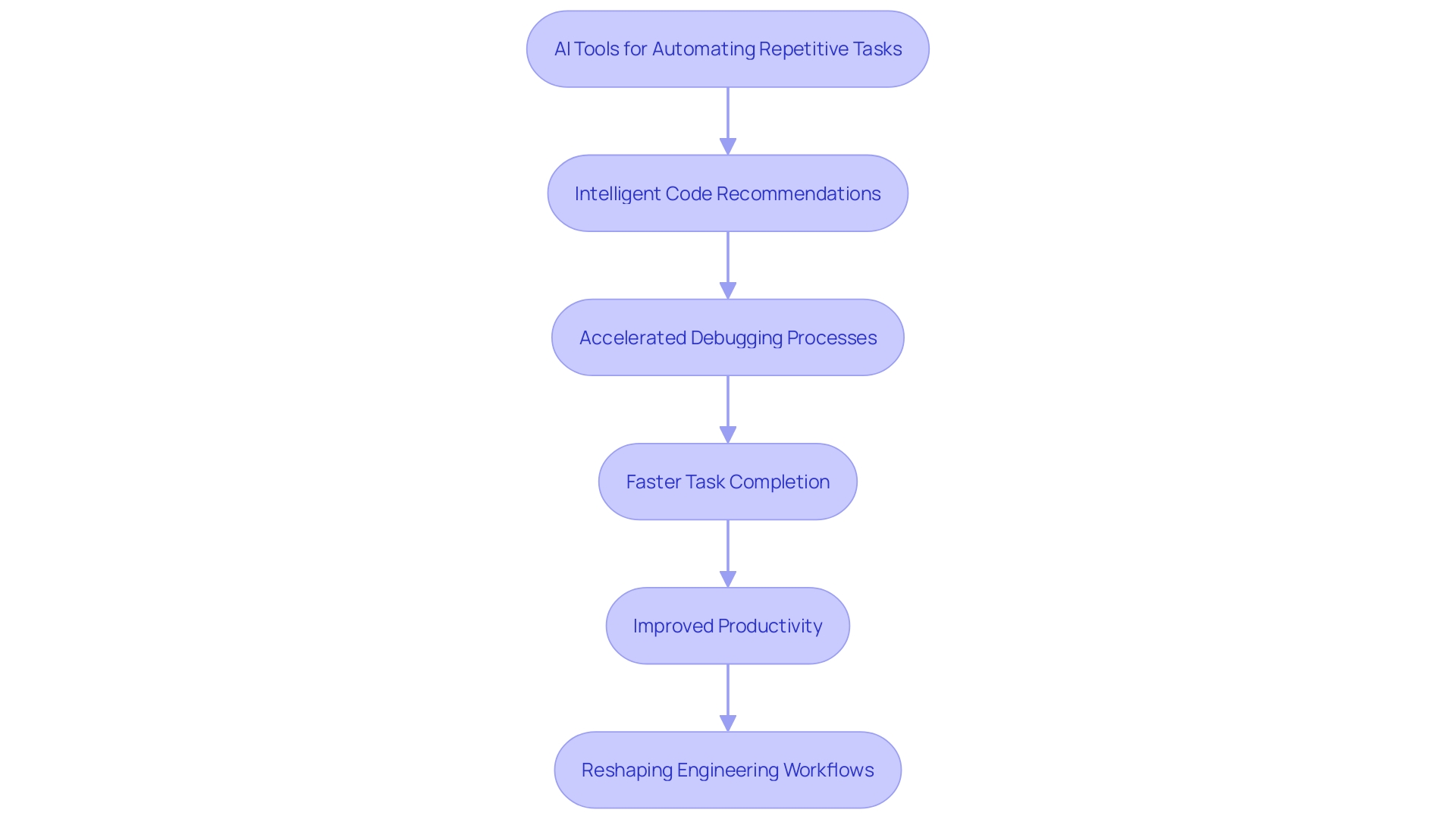
Research Findings: Productivity Improvements with AI Tools
Recent studies highlight significant productivity enhancements among developers utilizing AI resources. Groups employing AI-supported programming settings have been demonstrated to finish their assignments roughly 30% quicker than those utilizing conventional methods. This notable increase in speed is attributed to AI capabilities such as natural language code generation, automated testing, and intelligent code completion. Researchers carried out a randomized controlled trial involving hundreds of programming teams from a large multinational corporation to assess the effect of AI on production speed. The trial revealed that AI tools not only enhance individual productivity but also foster better collaboration by reducing bottlenecks in the development process. These findings suggest that integrating AI-powered workflows can lead to major efficiency gains and cost savings, potentially reshaping the future of software engineering. As AI continues to evolve, it is poised to play a pivotal role in transforming programming practices and driving business value across various industries.
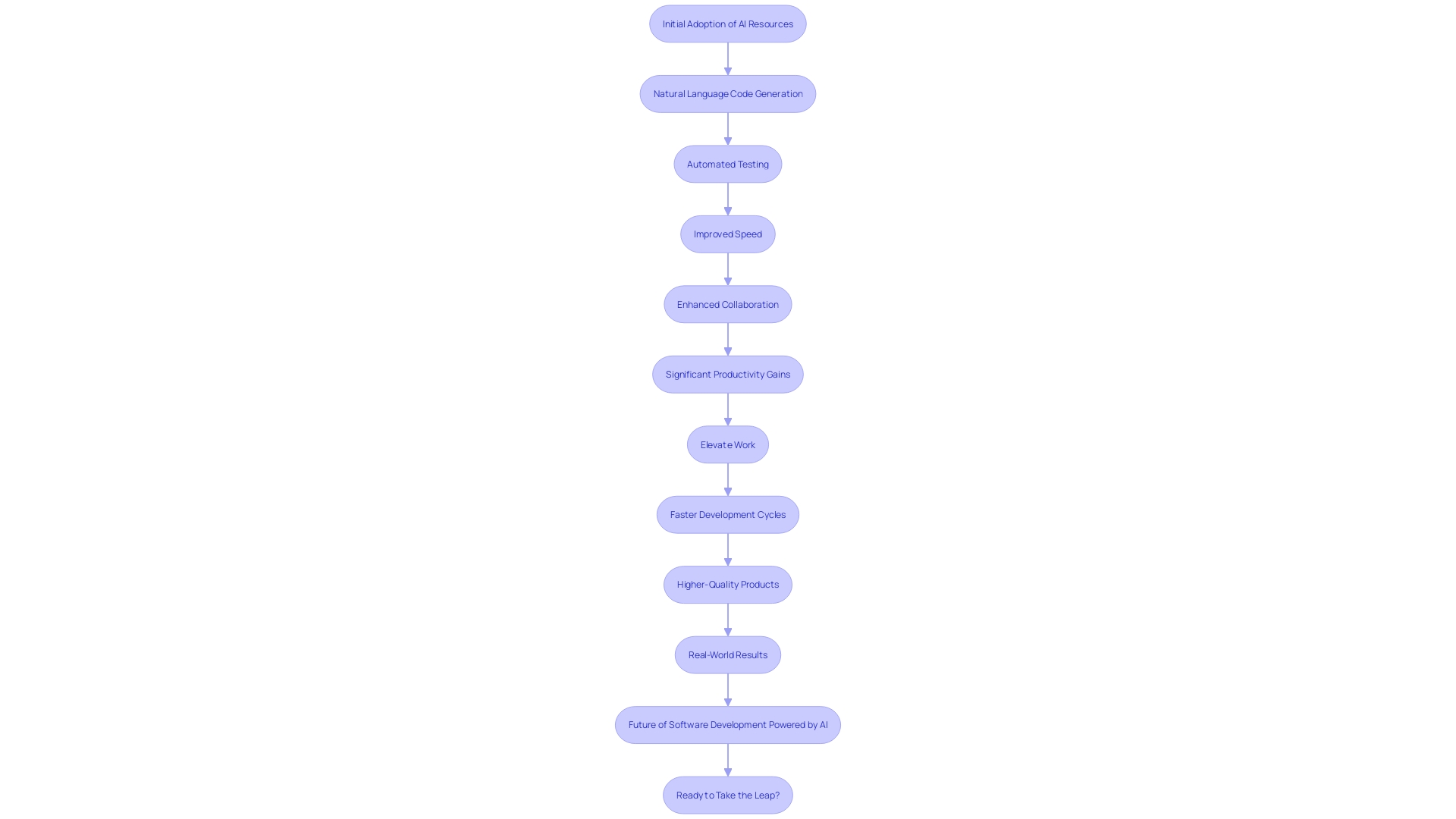
Case Study: GitHub Copilot and Developer Productivity
GitHub Copilot exemplifies the transformative power of AI in boosting developer productivity. By providing real-time code suggestions and context-aware completions, Copilot significantly reduces coding time. Based on a randomized controlled study involving hundreds of programming groups, those utilizing AI-driven resources like Copilot finished assignments approximately 30% more quickly than those depending on conventional approaches. Additionally, over 80% of participants successfully adopted Copilot, with a 96% success rate among initial users.
Developers report higher satisfaction levels and reduced frustration with mundane tasks, allowing them to focus on more creative problem-solving. This widespread acceptance emphasizes the efficiency improvements and cost reductions that AI tools can offer to the programming sector. As one developer noted, 'AI has and will undoubtedly revolutionize many industries, including software development, with its ability to automate tasks, optimize processes, and even assist in code generation.' Indeed, AI-powered programming assistants are poised to become an integral part of the modern developer's toolkit, enhancing productivity and enabling more innovative solutions.
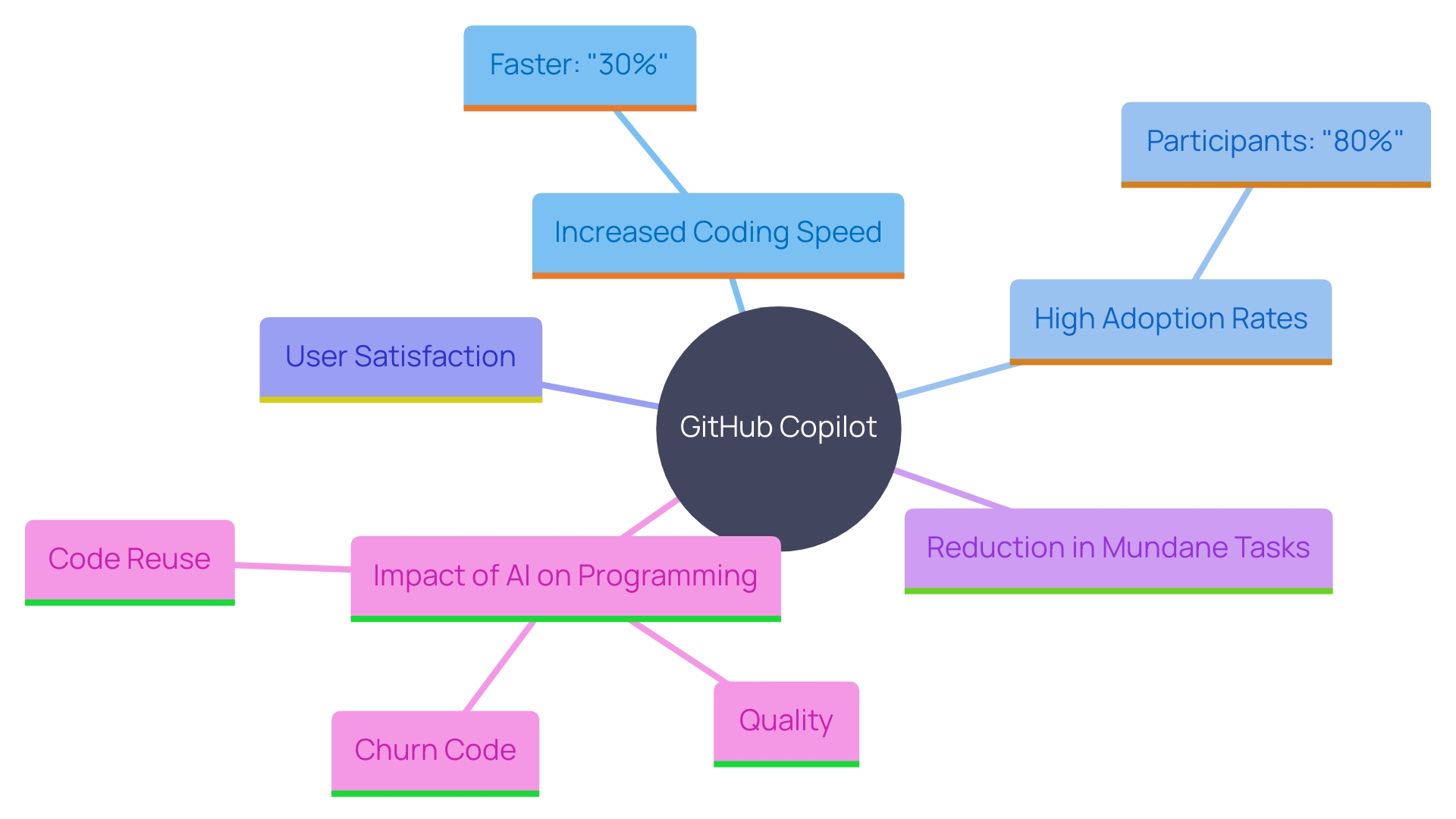
Impact on Different Skill Levels: Narrowing the Gap
AI resources assist developers of every expertise, making programming attainable for novices and improving the skills of experienced programmers. A large-scale experiment involving hundreds of programming groups from a multinational corporation demonstrated that teams utilizing AI-enhanced resources finished tasks approximately 30% quicker than those using conventional resources. 'This significant boost in productivity underscores the potential of AI-based coding assistants to revolutionize the development landscape, leading to substantial efficiency gains and cost savings across various industries.'.
These AI applications provide functionalities such as natural language code generation, automated testing, and intelligent code completion, delivering instant feedback and code examples. This helps bridge the knowledge gap, allowing novice developers to learn more effectively and seasoned programmers to explore advanced techniques without additional resources. The shift to AI-driven resources in engineering not only enhances productivity but also transforms the role and duties of developers, indicating a future where human creativity is augmented by AI effectiveness.
As AI continues to integrate into the engineering workspace, it's crucial to balance its benefits with the need for new skills and training. 'While AI applications can reduce errors and save time, there are mixed perceptions among developers regarding their limitations, such as potential mistakes and ethical concerns.'. 'Grasping these subtleties is crucial for facilitating a more effective and reliable incorporation of AI in software creation, ultimately leveraging Ai's potential to enhance, not substitute, human programming skills.'.
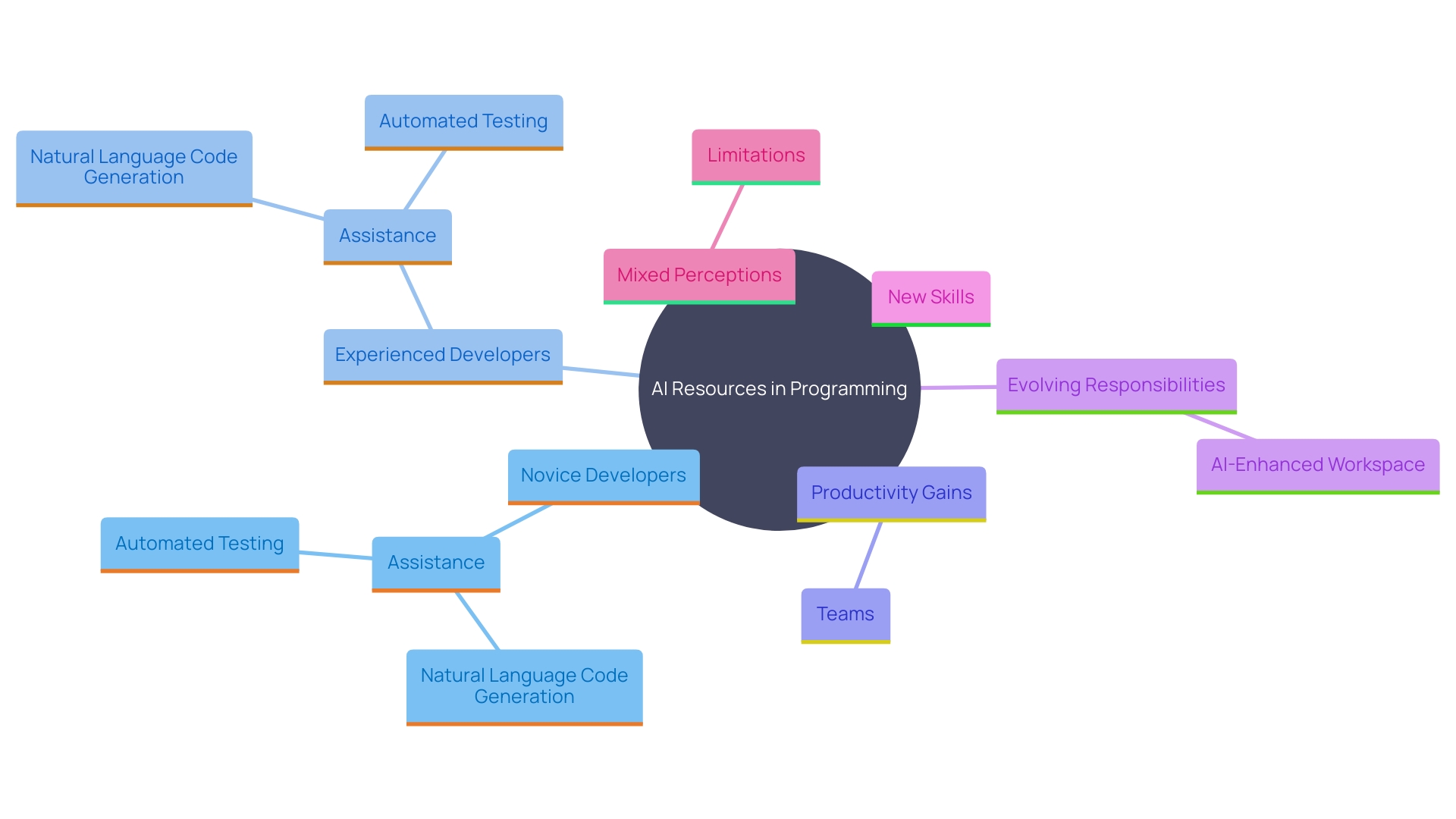
Comparative Analysis of AI Tools in Software Development
A comparative analysis of popular AI resources reveals distinct strengths and weaknesses that cater to various coding needs. Tools like Tabnine excel in code completion, boosting programming speed by providing intelligent suggestions. Meanwhile, others, such as Kite, offer comprehensive documentation support, making it easier for developers to understand and implement code efficiently.
A randomized controlled trial involving hundreds of software creation teams highlighted the significant influence of AI resources. Teams using AI-powered solutions, which included natural language code generation and automated testing, completed tasks about 30% faster than those using traditional methods. This implies that AI-driven programming assistants can significantly boost efficiency and decrease development duration.
Comprehending the present condition of AI programming aides is essential for incorporating these resources efficiently. Surveys suggest that while developers value the time-saving and error-reducing features of AI applications, they also raise concerns about possible privacy risks and ethical dilemmas. By tackling these challenges, AI resources can be more efficiently utilized to enhance human programming skills.
Ultimately, the collective benefit of these AI tools lies in their ability to streamline workflows and improve coding efficiency. Teams must evaluate their specific needs and workflows to choose the right AI solutions, ensuring they align with their development goals and enhance overall productivity.
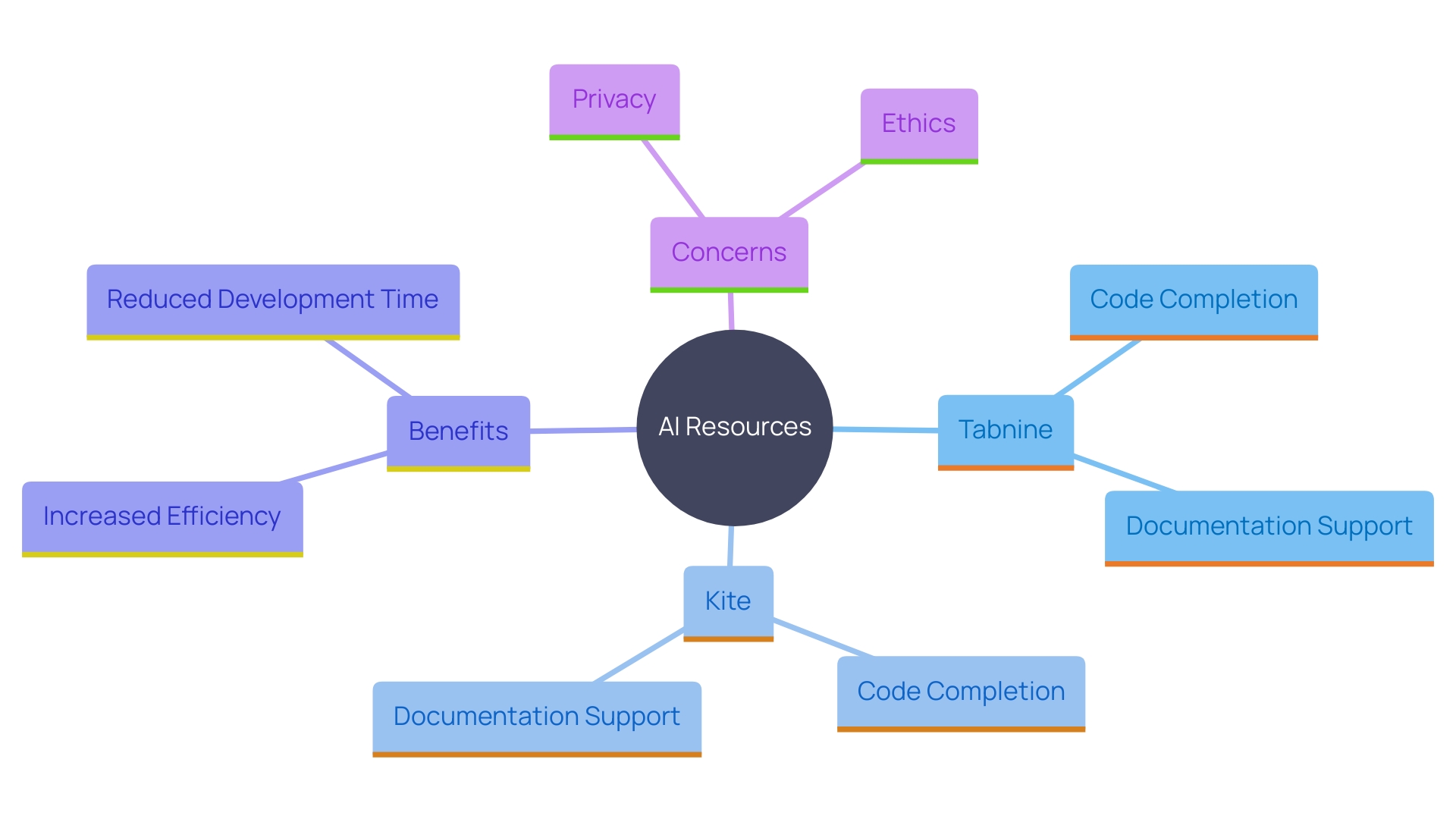
Conclusion
The integration of AI tools into software development represents a significant leap forward in enhancing productivity and efficiency. By automating repetitive tasks and providing intelligent code suggestions, AI has been shown to enable developers to complete their projects approximately 30% faster than those relying on traditional methods. This remarkable improvement not only accelerates the software development lifecycle but also allows teams to focus on more complex challenges, ultimately leading to higher quality outcomes.
Research findings and case studies, such as those involving GitHub Copilot, demonstrate the widespread benefits of AI in coding environments. Developers experience increased satisfaction and reduced frustration, which fosters a more innovative atmosphere. These tools are not just beneficial for experienced programmers; they also help bridge the knowledge gap for beginners, making coding more accessible and easier to learn.
As AI technology continues to evolve, its role in reshaping developer responsibilities and workflows becomes increasingly evident. The need for new skills and training will be crucial to maximize the advantages of AI while addressing any concerns related to privacy and ethical considerations. Embracing these tools can lead to substantial efficiency gains and cost savings, solidifying AI's position as an indispensable asset in the modern developer's toolkit.
Frequently Asked Questions
What are AI resources in programming?
AI resources are tools and applications that leverage artificial intelligence to assist developers. They automate repetitive tasks, provide intelligent code recommendations, and enhance debugging processes.
How do AI resources impact coding efficiency?
Studies show that teams using AI resources complete their tasks about 30% faster than those using traditional methods. AI features, such as natural language code generation, automated testing, and intelligent code completion, streamline workflows and improve overall productivity.
What evidence supports the effectiveness of AI in programming?
A randomized controlled trial involving hundreds of programming groups revealed significant productivity enhancements among those using AI-supported tools. These findings are backed by comprehensive telemetry data.
What specific AI tools are mentioned in the study?
Tools like GitHub Copilot, Tabnine, and Kite are highlighted for their capabilities. GitHub Copilot, for instance, provides real-time code suggestions and context-aware completions, significantly reducing coding time.
What are the benefits of using AI tools for developers?
AI tools help reduce mundane tasks, allowing developers to focus on more creative problem-solving. They also provide instant feedback and code examples, which can aid both novice and experienced programmers in improving their skills.
Are there any concerns regarding the use of AI in programming?
Yes, while AI applications can reduce errors and save time, developers have expressed mixed perceptions regarding their limitations, such as potential mistakes and ethical concerns. Understanding these challenges is crucial for effective integration.
How does AI change the role of developers?
As AI tools become more integrated into engineering workflows, they reshape the responsibilities of developers, emphasizing the need for new skills and training to effectively collaborate with AI technologies.
What should teams consider when choosing AI resources?
Teams should evaluate their specific needs and workflows to select AI solutions that align with their development goals and enhance overall productivity.
What is the future outlook for AI in software engineering?
AI is poised to play a pivotal role in transforming programming practices, driving business value across various industries, and enhancing developer productivity and creativity.




